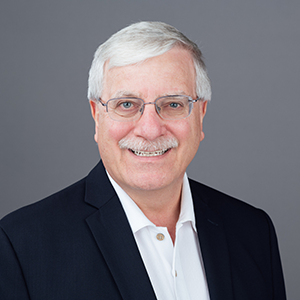Fowler Management Professor Fired Up by His Long-Standing Passion for Entrepreneurship
After a deadly arson-instigated fire in the Las Vegas Hilton in 1981, events scheduled at the hotel were either forced to cancel or change venues while the building was rebuilt and rehabilitated from the resulting damage.
Although he didn’t know it at the time, the fire would have a profound impact on Alex DeNoble’s career at San Diego State University.
DeNoble, now a professor of management at SDSU’s Fowler College of Business and the executive director of the Lavin Entrepreneurship Center, was a Ph.D. student at Virginia Tech University in 1981. He was planning to make his first trip to the annual Academy of Management Conference which was scheduled to be held at the Las Vegas Hilton (now the Westgate Las Vegas). “After the fire broke out, the only place that conference organizers could find that could accommodate a conference of that size with short notice was the Town and Country Resort in San Diego,” said DeNoble, a native of Jersey City, New Jersey. “I’d never been to California before and when I landed in San Diego, I was simply taken with the city.”

Alex DeNoble
After arriving in San Diego, DeNoble met with a friend, Richard Castaldi, who was a SDSU management professor at that time. Castaldi gave DeNoble a tour of the SDSU campus and DeNoble returned the following year for an interview. “When they offered me the position, I immediately accepted and closed down all other interviews I had scheduled,” said DeNoble, who began his academic career as an assistant management professor in the fall of 1983.
Pioneering Entrepreneurship Education at SDSU
During his long career at SDSU, DeNoble has taken on many roles including chair of
the SDSU management department and the college’s steering committee, but he says he
is most proud of his role as the executive director of the Lavin Entrepreneurship Center. His interest in entrepreneurship was sparked by the active start-up community in
San Diego and by the late Daryl Mitton, a former SDSU management professor who established one of the first university-based
entrepreneurship centers in the world in 1980. DeNoble was involved with what was
then called the Entrepreneurial Management Center when it received its initial funding
in 1986. He became the executive director in 2012, the same year the center was named
in honor of successful entrepreneur and businessman, Leonard Lavin.
DeNoble’s years of dedication and service to entrepreneurship education has bolstered his reputation as an expert in the field and he has earned a multitude of awards for his leadership. In 2019, he received the Lifetime Achievement Award from the International Council for Small Business, and he was recognized by the United States Association for Small Business and Entrepreneurship (USASBE) as a Justin G. Longenecker Fellow for his “outstanding contribution to the development, furtherance and benefit of small and medium businesses” in 2018. Additionally, he has been recognized by the International Council for Small Business (ICSB) in 2016 with their Presidential Award, and he received the industry’s Karl Vesper Entrepreneurship Pioneer Award in 2013 from the Experiential Classroom program.
His role as an expert and trendsetter led DeNoble to establish the annual California Entrepreneurship Educators Conference in 2014. “Last year’s online event welcomed 423 attendees from 21 countries to discuss the development of programs that embrace entrepreneurship education and research,” he said. “The conference serves as a springboard for the sharing of entrepreneurship initiatives taking place on college campuses around the world.”
What it Takes to Succeed
In spite of his years of service to the university and his many personal accomplishments,
DeNoble still derives his greatest satisfaction from seeing his students succeed in
their professional careers. But he cautions that it takes more than dreaming big to
become a success. “So many of our students believe that all they have to do is come
up with the latest and greatest business idea to launch a thriving company,” he said.
“But without the ability to engage with potential customers, suppliers, competitors,
investors and others, the idea will only remain in their heads. A student entrepreneur
must have the confidence to be proactive in dealing with the many inevitable obstacles
along the way if they are to truly succeed.

